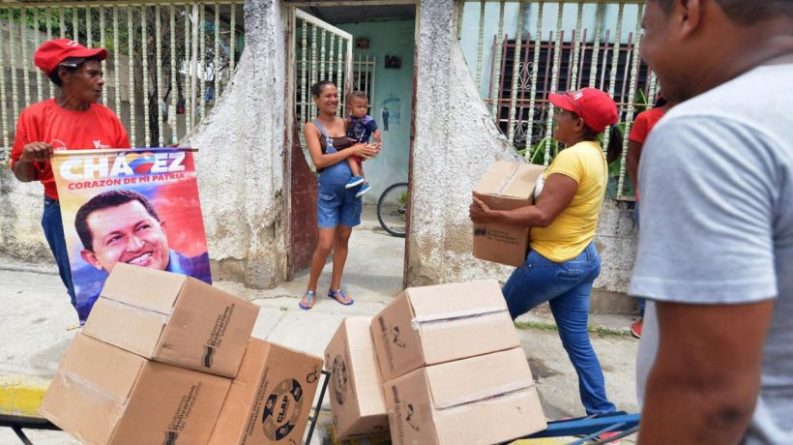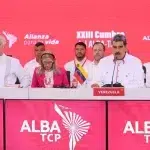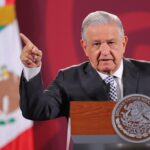
Attacks against Venezuela have been at different scales and intensities for 20 years by the establishment that heads the corporate elite of the United States, however, the lack of results in the immediate present has forced these actors to intensify the economic blockade that, combined with terrorist attacks on public services, seeks to deconfigure all social fabric and the notion of a state.
The last tactic of economic strangulation on the Venezuelan population is focused around the Local Supply and Production Committees (CLAP), the Venezuelan government’s flagship program that contains the effects of US aggression against the country.
CLAP: NOT ONLY SUPPLY, BUT ALSO PRODUCTION
The Venezuelan government created this program in April 2016, based on a model of direct distribution and local production in the 24 states of the country in response to the continuous hording that was expressed in large queues and bachaqueo (purchase of products at regulated prices and sale in the informal market with surcharges of between one thousand and four thousand percent), basically to ensure that the products reach all sectors.
These committees constitute a new form of popular organization in charge, together with the government, of the house-to-house distribution of the regulated products of first necessity to combat the smuggling of extracted essential items such as corn flour, edible oil, rice, pasta, milk powder, black beans and sugar.
“This is the beginning of a new productive path and the first steps already announce the success of this path,” President Nicolás Maduro pointed out at the time, emphasizing the productive vocation of this type of organization that goes beyond the simple distribution of food, of national or foreign origin.
Each CLAP is made up of four articulated bodies: the National Union of Women (UnaMujer), the Bolívar-Chávez Battle Unit (Ubch), the Francisco de Miranda Front (FFM) and the different communal councils of each territory, whose first task is to hold a census of population of the locality, in which it registers who lives where, with how many people and what their needs are. When they receive the combos (boxes or bags) of food, they inform the community and organize their distribution in a certain place.
Since their launch, they have advanced in various forms of distribution and production such as the fishing CLAP that has distributed more than 1000 tons of fish in the country, the textiles CLAP that is in charge of making school uniforms; their own packing centers or the Maternal CLAP, an initiative that promotes prenatal care to reduce maternal-neonatal morbidity.
BLOCKING AND DISINFORMATION: COLOMBIA CASE
Between July and August of 2017, after the National Constituent Assembly (ANC) was elected and installed, the highest level of food distribution was reached by the CLAPs, reaching 10 million 820 thousand 713 Venezuelan families. Likewise, in 2017 the disinformation war against this key initiative for the Venezuelan people was intensified as part of the ongoing coup process organized by the anti-Chavista movement to generate the conditions that would justify an international intervention.
In May 2018 the government of Colombia blocked the entry of 15 containers with 25 thousand 210 CLAP combos into Venezuela, in an operation in Cartagena by Colombia’s revenue and customs police and was announced by the then president of Colombia, Juan Manuel Santos. Santos confirmed the decision taken by the Colombian Ministry of Finance and US Department of the Treasury, after the celebration of the Summit of the Americas in Peru, to prevent food access to Venezuela under the facade of the fight against corruption.
Un reconocimiento para @PoliciaAduanera, @DIANColombia e @invimacolombia, que decomisaron ayer en Cartagena casi 400 toneladas de alimentos no aptos para consumo que iban a ser repartidos por Comités Locales de Abastecimiento y Producción en Venezuela. pic.twitter.com/UQrgevrnco
— Juan Manuel Santos (@JuanManSantos) May 17, 2018
At that time, Santos linked the international acquisition of food by Venezuela with alleged crimes of money laundering and illicit activities, that was part of the narrative of a supposed corruption plot in the context of the media campaign against the government of Nicolás Maduro, based on accusations without evidence and sanctions against political figures.
RELATED CONTENT: Sen. Graham’s Call for Military Intervention in Venezuela: A Scare Tactic?
That was the moment in which the Colombian oligarchy, represented by the then President, took the anti-Venezuelan lead in the region and pointed towards the commercialized sabotage of food between Venezuela and companies from neighboring countries.
MORE BLOCKING AND MISINFORMATION: CASE MEXICO
In October of that year, under the government of Enrique Peña Nieto, the Attorney General of the Republic of Mexico reported that it initiated an investigation into unusual operations against individuals and private entities dedicated to the sale of basic foods and who have obtained Venezuelan public funds.
The information was provided by Alonso Lira, deputy attorney general of Mexico, who indicated that 1 million 300 thousand combos (boxes or bags) were located in 1,300 containers of food in Mexico bound for Venezuela, alluding to the alleged existence of operators who came fro different countries to contact other companies and get them.
Lira pointed out, as a “reparatory agreement” of the crime, that the accused had to deliver three million dollars to the United Nations High Commissioner for Refugees (UNHCR). In addition, they would commit not to carry out any commercial act with the Venezuelan government or with third parties that operate in the shipment, marketing of food or medicine for the CLAP program.
#PGR inició carpeta de investigación por operaciones inusuales en contra de personas físicas y morales dedicadas a la venta de alimentos básicos y que han obtenido recursos públicos venezolanos provenientes de un programa gubernamental de ayuda humanitaria: Alonso Lira #SEIDO pic.twitter.com/Roj96zy8HC
— FGR México (@FGRMexico) October 18, 2018
Media financed by the State Department made a series of reports denouncing acts of corruption in food procurement and distribution of CLAP combos in which they pointed to Alex Saab, a Colombian businessman, as implicated.
The Venezuelan president said at the time that “Venezuela will continue buying the products it needs to supplement the CLAP’s diet, which reaches 6 million homes” and affirmed that the Mexican Attorney’s Office had setup a “false positive, of investigation”, to intimidate those companies that commercialize with the Venezuelan state. In addition, he assured that the companies that produce in Mexico were raided so that “no businessman dares to sell to Venezuela” referring to the fact that thanks to the pressure of entrepreneurs, food was being shipped to Venezuela.
“Everything was done to avoid overpricing and the purchase of poor quality products, but it turned out that they were quality products and that they were paid at the prices that have to be paid (…), hypocrites, frauds, pharisees,” he added.
From another side, the producers of a Mexican-Colombian-American series called “The Lord of the Skies”, which was banned in Venezuela for apologetics to drug trafficking and related crimes, included in the plot alleged murky negotiations between Mexico and Venezuela for the importation of food to our country.
MUCH MORE BLOCKING AND MISINFORMATION: INTERNAL ATTACKS
In January 2018, in a speech before the ANC, the national coordinator of this initiative, Freddy Bernal, denounced the economic war whose increasing attacks was responsible for the decreased numbers in the distribution of food, such as as political violence through violent groups (color revolution between the months of April and July), while the financial siege of the United States, also hindered the import of food into the country.
At that time, the Minister for Defense and head of the Grand Mission of Sovereign Supply, Vladimir Padrino López, said that, due to economic sabotage, there had been delays in the arrival of the food combos and that they would arrive “more than 1,500 containers with combos for the people of Venezuela, as part of the protection policies of the national government,” along with raw products such as white corn, soy cakes, yellow corn, and rice, among others.
Meanwhile, the network of remote-controlled media from USAID ran calculations regarding a supposed scheme of overpricing in the boxes, even though they have systematically made invisible the speculation structures established by their national sectors on the prices of food that are not part of CLAP and obviating the undeclared blackout by national “productive” (private) groups that have received financing from the Venezuelan State, but did not activate the generation of products for domestic consumption.
The presence in CLAP of products imported from countries such as Mexico, Turkey, Uruguay, Brazil, among others, is due to this national productive insufficiency, which is also an effect of financial blocking measures imposed since 2014, however, the transnational mediocracy has decreed that such an alternative decided by the national government is due to “a flawed system that does not respond to the majority of Venezuelans.”
When the Peña Nieto administration tried to block the supply of food for the CLAP, the National Assembly (AN), already in contempt, stated that it had collaborated with the alleged investigation carried out by the Mexican State. “There was a follow-up and a collaboration, of course, on the part of the Parliament, but the alarms ran on the Mexican side when they thought taxes were being flouted,” said deputy Juan Guaidó then.
In October 2018, anti-Chavista deputy Freddy Superlano announced that a Venezuelan parliamentary (in contempt) commission was in Mexico, investigating an alleged scheme of corruption in CLAP and formally filled the complaint to the Mexican attorney general, after “they discovered permits delivered to companies without having all the elements and requirements required by Mexican Law”. The course of a trial or final judgment by the Mexican State is unknown.
He added that between 9 and 14 companies registered in Mexico served only as a facade. “They were selling overpriced food to Venezuela, in some cases the overprice was 112% in Mexican products, but in other areas they overcharged up to 777% as is the case of milk.” It is unknown if the deputy made any complaint to the Venezuelan Public Ministry. The object of their conjectures was to feed the narrative against a vital social policy for the Venezuelan population, adding elements to the antichavista agenda based on ignorance of any institutionality.
Superlano argued that the National Assembly is not against bringing food to the country, “we are talking about the whole plot that the government has to bring the few foods that are in the country, and they invent the story that we are taking food across the border (to Colombia or Brazil) or that we are lying when we say the country stopped producing for many years ago,” ignoring the extraction contraband and the flight of foreign capital exercised by the Venezuelan business sector.
SABOTAGE AS A SIGN OF DESPAIR
On February 27, a warehouse located in the Port of La Guaira, where the boxes of food are assembled, was set on fire at dawn. The head of the Guard of the Presidential Command Post and then Minister for Electric Power, Luis Motta Domínguez, said that “this is a terrorist act against the Venezuelan people, an act of sabotage against a State institution. The opposition has made them commit miserable acts like this, which is a crime against humanity. ”
Motta indicated that the losses were significant, both in food and packaging material. There were also losses in forklift equipment, shelves and infrastructure.
According to the governor of the state of Vargas, Jorge Luis García Carneiro, the loss was controlled by 60% through the action of different bodies of firefighters and members of the Bolivarian National Armed Forces (FANB). He added that “… unscrupulous, terrorist hands, to create chaos in the distribution of food, have set fire to a part of what we consider one of the most horrific acts that we can commit and that is to take food away from our people.”
Está mañana la derecha extremista incendió un centro de empaquetado de los CLAP. Esa es la ayuda humanitaria que quieren para el pueblo: violencia y destrucción! Ya el Pdte @NicolasMaduro giró instrucciones para reponer de inmediato los alimentos para el pueblo! Venezuela vencerá pic.twitter.com/iQxsvKLN1m
— Delcy Rodríguez (@DrodriguezVen) February 27, 2019
He specified that they did not rule out that it had been a terrorist event given that, where the fire occurred, there are “no electrical outlets that could give us the idea that it was a short circuit or something similar”.
WASHINGTON NOW GOES (DIRECTLY) AGAINST THE CLAP
Freddy Bernal, warned last May 19 that the Trump administration “sanctioned 10 out of 12 shipping companies that transport food to Venezuela, which causes delays in the arrival of the items to the country, that is, what arrived in a month, now will take three months. ”
In addition to coercive actions against shipping companies, direct payments for bank transfers in dollars made by the State are often rejected and must be paid through third countries. A payment “that was executed in 20 days, now takes 45, 60 days”, detailed the head of the CLAP.
That same week, Reuters reported that the United States is preparing “sanctions and criminal charges against Venezuelan officials and others suspected of using a food aid program administered by the Army to launder money for the government of President Nicolás Maduro,” attributing the information to “sources familiar with the matter”.
On the other hand, on May 22, EFE transmitted statements by Elliott Abrams, visible face of the aggression against Venezuela, regarding the United States is preparing a new package of sanctions against “Chavista officials who got rich illegally, with the Food Assistance Program of the Local Supply and Production Committees (CLAP)”.
“They know that this plan is corrupt, we know it and we are investigating the details, we do not have an announced date on the sanctions and the (judicial) accusations that will come in. But this is a real crime because it is what the poorest Venezuelans need to survive,” Abrams added. This operator stressed that the United States prepares sanctions and criminal charges against officials of the FANB, allegedly for laundering money.
The real effects of these actions have already been demonstrated: the sanctions will slow the process of food acquisition much more and will seek to deepen the chaos and crisis imposed by the corporate elites and their operators against the Venezuelan population. The Trump administration, which has intensified its aggression against Venezuela since January, will take these actions within the next three months to reduce the “cash flow to Maduro and his loyalists.”
On its route to undermine the Bolivarian Republic of Venezuela, the United States unilaterally determines who deserves to eat, who is corrupt, which companies commit crimes, which are the penalties or fines that must be paid, among other arbitrariness. Hence, the destruction of the Venezuelan nation will be a way to establish a new order in which the mentioned elites govern without any objection.
Translated by JRE\EF
- orinocotribunehttps://orinocotribune.com/author/orinocotribune/
- orinocotribunehttps://orinocotribune.com/author/orinocotribune/
- orinocotribunehttps://orinocotribune.com/author/orinocotribune/
- orinocotribunehttps://orinocotribune.com/author/orinocotribune/
Share this:
- Click to share on Twitter (Opens in new window)
- Click to share on Facebook (Opens in new window)
- Click to share on LinkedIn (Opens in new window)
- Click to share on WhatsApp (Opens in new window)
- Click to share on Reddit (Opens in new window)
- Click to share on Telegram (Opens in new window)
- Click to email a link to a friend (Opens in new window)





